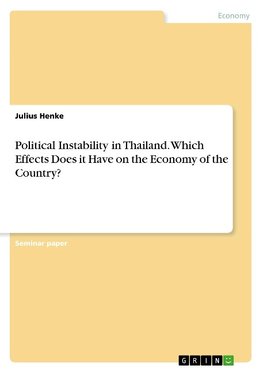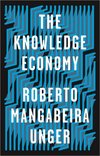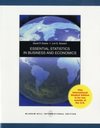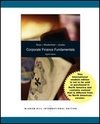
-
 Anglický jazyk
Anglický jazyk
Political Instability in Thailand. Which Effects Does it Have on the Economy of the Country?
Autor: Julius Henke
Seminar paper from the year 2018 in the subject Economics - Case Scenarios, RWTH Aachen University, language: English, abstract: What are the consequences of these frequent changes of government on the domestic economy in Thailand? Is political instability... Viac o knihe
Na objednávku
17.55 €
bežná cena: 19.50 €
O knihe
Seminar paper from the year 2018 in the subject Economics - Case Scenarios, RWTH Aachen University, language: English, abstract: What are the consequences of these frequent changes of government on the domestic economy in Thailand? Is political instability likely to have a positive effect on economic growth? Against this background I would like to examine in this paper the extent to which political instability affects the economy in Thailand. First, the concept of political instability and the link to economic growth as presented in recent literature will be explained. A description of the political and economic history of Thailand will follow. After that, the relationship between political instability and economic growth within Thailand will be analysed using selected indicators.
Between 1932 and 1997, Thailand had twenty-four governments, often emerging in the wake of major political crises. During these years, Thailand went through ten coups and sixteen failed coup attempts. Accordingly, the average tenure of a Thai government has been about twenty-four months. The longest survived one hundred months, under Prem Tinsulanonda (16th Prime Minister between 1980 and 1988) the shortest, under Suchinda Kraprayoon (19th Prime Minister between 7 April 1992 and 24 May 1992), only two months.
Historically, Thailand had largely positive growth rates of between five and ten percent. Thailand's economy has grown increasingly over the last 25 years. Except for two major events, the Asian financial crisis in 1997 and the global economic crisis beginning in 2007. However, it can be said that economic growth in recent years has increased, despite the above-average number of changes of government and military coups.
Political instability leads to greater uncertainty for economic actors within instable countries and can lead to fewer investments being made. The investment climate is suffering from violent conflicts such as civil wars, wars between nations, politically motivated attacks, coups d'états. Also frequent changes of government can generate uncertainty.
- Vydavateľstvo: GRIN Verlag
- Rok vydania: 2019
- Formát: Paperback
- Rozmer: 210 x 148 mm
- Jazyk: Anglický jazyk
- ISBN: 9783668967373












